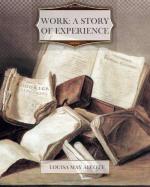“It has grovn sweet now, David, I am sure,” said Christie, very low.
“No, not yet,” he answered with the stern honesty that would not let him deceive himself or others, cost what it might to be true. “There is a certain solid satisfaction in it that I did not use to find. It is not a mere dogged persistence now, as it once was, and that is a step towards loving it perhaps.”
He spoke half to himself, and sat leaning his head on both hands propped on his knees, looking down as if the weight of the old trouble bent his shoulders again.
“What more, David?” said Christie.
“Only this. When I found I had got to live, and live manfully, I said to myself, ‘I must have help or I cannot do it.’ To no living soul could I tell my grief, not even to my mother, for she had her own to bear: no human being could help me, yet I must have help or give up shamefully. Then I did what others do when all else fails to sustain them; I turned to God: not humbly, not devoutly or trustfully, but doubtfully, bitterly, and rebelliously; for I said in my despairing heart, ’If there is a God, let Him help me, and I will believe.’ He did help me, and I kept my word.”
“Oh, David, how?” whispered Christie after a moment’s silence, for the last words were solemn in their earnestness.
“The help did not come at once. No miracle answered me, and I thought my cry had not been heard. But it had, and slowly something like submission came to me. It was not cheerful nor pious: it was only a dumb, sad sort of patience without hope or faith. It was better than desperation; so I accepted it, and bore the inevitable as well as I could. Presently, courage seemed to spring up again: I was ashamed to be beaten in the first battle, and some sort of blind instinct made me long to break away from the past and begin again. My father was dead; mother left all to me, and followed where I led. I sold the old place, bought this, and, shutting out the world as much as I could, I fell to work as if my life depended on it. That was five or six years ago: and for a long time I delved away without interest or pleasure, merely as a safety-valve for my energies, and a means of living; for I gave up all my earlier hopes and plans when the trouble came.
“I did not love my work; but it was good for me, and helped cure my sick soul. I never guessed why I felt better, but dug on with indifference first, then felt pride in my garden, then interest in the plants I tended, and by and by I saw what they had done for me, and loved them like true friends.”
A broad woodbine leaf had been fluttering against David’s head, as he leaned on the slender pillar of the porch where it grew. Now, as if involuntarily, he laid his cheek against it with a caressing gesture, and sat looking over the garden lying dewy and still in the moonlight, with the grateful look of a man who has learned the healing miracles of Nature and how near she is to God.




